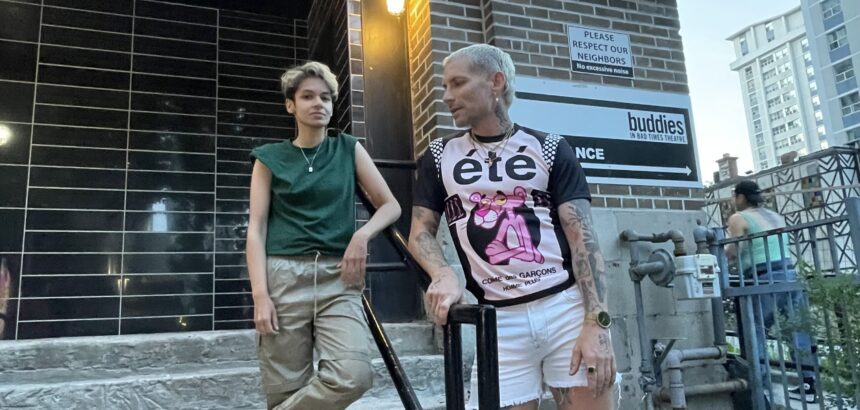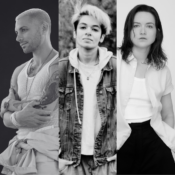Compiled from assorted conversations
between ted witzel + Erum Khan,
Creatively composed by Susanna Fournier
****
Community. Arguably an overused word these days. It’s rallied around, applauded, wielded, and leveraged. But what is it? What are we talking about when we talk about community? Quick Google searches agree it basically means a group of people considered “a unit” because they have common interests or share some kind of identity-forming narrative [political, social, religious, cultural, familial]. Thanks, Google.
****
I used to think I knew what community meant. Now, I know less and less.
Community is a double-edged sword because I’ll use the word — countlessly — in so many moments of my day. What is your community? What are you seeking? And I feel like it makes sense briefly — something we take on, something we allow, and also push against.
I think I understand the word in specific conversations, with specific people, in casual moments, in real life. For the first time ever, I’m slowly experiencing versions of it. But the moment it’s printed and has a FONT and some arts org emails me saying they’re giving free somethings to the “community,” I’m lost again.
So, it’s this constantly changing but non-associative word so full of tension for me. It’s irritating.
When we revised Buddies values, we intentionally moved away from this word — community — for this reason. In a time when it feels every organization [from NGO to corporate] is claiming community as a value, it’s relevant [maybe even radical] to question whether the word has simply become another optical illusion.
[I think I’ve gotten to the point where I just hate the word community]. But I do seek it.****
Collectivity is what I think is easiest to name as community. I think that’s why so many arts organizations are saying, we build community, we strengthen community. Because there’s collectiveness in the act of relating to performance or liveness by virtue of the fact we’re all demanded to be there physically and give something of ourselves to it.
But conversations around community in the arts have gone from “we need to invite our communities into our buildings” to “we need to invite the community to co-create with us.” Add the frameworks of social justice [especially online culture and its pitfalls], and now we’re expected to Be-In-Community. The pressure of that expectation feels like I’m taken hostage by community.
[When somebody tells me I have to be in community, I don’t want to be in community].I don’t necessarily want to be offering that much of myself to an arts organization. When I go see a show, I just want to go look at the damn thing, not produce a binding responsibility between it and myself.
****
Community is not static. Sure a space [like Buddies] may hold the potential for collectivity, but what we’re doing in that space is constantly changing. I’m changing, the city is changing, Buddies is changing, the shows are changing. Community, liberation, queerness are all changing. They’re full of dynamic tensions and shifts, yet I think we’re getting stuck right now in a static moment of deciding; this is community, this is queerness. What happens to individual agency then?
****
Buddies was the first place I was naked on stage, one of the first places I felt I could approach content that is so central to my work without shame or without shame being cast upon it. But did I find a community? Or did I find a conspiratorial thread? Are those different? I don’t know.
Collectivity within a space can cultivate a kind of solidarity. Is this community? Asking myself, how can I be myself but also belong in a way that is bigger than myself in a space and with a group inviting that from me?
I mean, a space is just a space. Dynamism is what’s exciting about a venue. I don’t go to a bar or dance club or show because I think I’m going to see the same people, but because I want to be in a good fucking crowd. I think that’s actually the thing we often mistake for community.
Dr. Vanessa Andreotti talks about this specific hormone or brain chemical that speaks to this sense of belonging [I wish I could remember the name, it’s in a notebook, I swear]. It’s there to create a sense of safety, so you know who your people are. It’s the same eudaimonic pleasure of participating in the arts or being in a stadium of fans.
It feels amazing — which I feel — is liberating. Is this community?
****
Why is the word community synonymous with marginalization? [Well not synonymous but you know]. Like are we the DuPont commune? I mean, why are we using the words we use? What’s another word we could use?
[A facilitator from Scotland, Emma Jayne Park, uses the word public instead of community. What is/are the public(s) you are trying to reach?].Community is a tricky conversation. Especially for an institution, like Buddies, which has already existed for over 45 years. There’s the blurriness of all our other conversations like, how do we think about who’s coming into these spaces? Because there are people [certain Publix], who’ve vowed to never step foot in this building anymore because of how they’ve felt treated here.
But there’s something about coming in right now as two artists that feels unique in the sense that we’re actively trying to think about a shift in the vision, the programming, and question everything not in a way that ignores the tensions in Buddies’s history [and its past and present] but in a way that engages with them.
Is this community?
****
I also don’t know if any institution has the right to claim a community. If we’re accepting that the word community has meaning — or did at some point — I think if anything, communities can claim an institution.
****
Community is a word that doesn’t mean anything anymore. It can have meaning [it did have meaning for a second, I think] but now people expect it to hold their entire existence within it and it can’t hold it.
It makes me nervous. It’s used so much as a tool in which a kind of political and behavioral orthodoxy is enforced. If queerness supposedly values diversity, why is the ‘community’ seen [at times] to insist on a homogeneity of thought or political belief?
Conversations about community can easily become an ugly mess pool.
****
There’s something about Buddies being a space in which there’s a specific challenge to locate queerness as an aesthetic or formal proposition that made it easier for me to relate to other queer people. I’ve never really been that deep into queer community. I don’t have a gaggle of gays. I find it hard to be friends with a density of gays without having sex with most of them.
Is this community?
****
We decided to work together because we’re different. We’re different human beings, different generations, different politics. We have disagreements about the work we’re doing and how we do it but at the same time we’re actively developing our own vocabulary. It’s fascinating and crucial and I think speaks directly to the kind of liberation we’re hoping to embody here. There’s enough aesthetic overlap, enough similarities, [and shared desire] we felt we could make a common mission out of that. [According to Google, this is the basis for community].
As we’ve said, it’s fucking impossible to actually represent everybody who wants to be represented on our stages solely by identity markers — but we’re trying to assemble work that impacts everyone from a variety of aesthetic, dramaturgical, and formal markers. Hopefully the expansive nature of these offerings allows people whose material identity or experience is not reflected to still have ways into the work, this space, and each other.
It’s like, okay, let’s bring people back into this building and remind them like they’re okay and take care of them a little bit.
We’re going to find ways to make room for everyone and push you slowly and like — we know things fall through the cracks and we have to pull them back out and our individual liberations are bound up in the collective liberation and it feels like baby steps — but we want to reach that world of all the things.
We didn’t forget about you.
Is this community?



This is excellent.. thank you